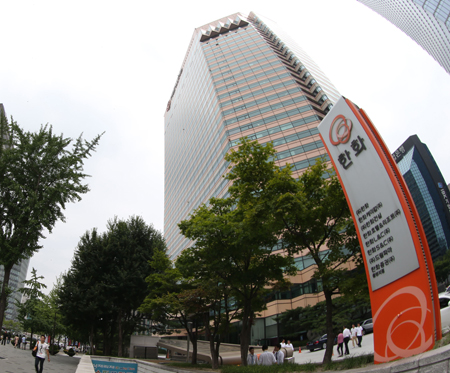
Hanwha gives up buying ING unit

Construction project in Iraq will continue as planned
Upon the arrest of its chairman, Hanwha Group has virtually abandoned any intention of acquiring ING Life’s Southeast Asian business.
Previously, the group had been competing with multinational life insurer AIA Group to take over the Southeast Asian arm of the Dutch firm in an effort to advance into global markets.
“We have engaged in a fierce competition to buy ING’s Southeast Asian unit, but it seems the situation is not favorable for us, although I’m not sure if it is related to the current issue (of the arrest of our chairman),” an official from the group said. “You can say we will not carry out our plan for the acquisition.”
The withdrawal came as group Chairman Kim Seung-youn was sentenced Thursday to four years in prison and a 5 billion won fine for embezzling corporate funds to pay back the debts of companies he has ran secretly under different names.
This withdrawal marks the second failure in the group’s attempts to acquire a life insurance firm after an unsuccessful move for Tongyang Life Insurance in May.
Kim showed great interest in buying the ING’s unit as he wanted to strengthen in that area after acquiring the nation’s second-largest insurer, Korea Life Insurance, in 2002.
Hanwha has seven financial affiliates under its wing and succeeded in changing its insurance subsidy’s name to Hanwha Life Insurance in July to strengthen its overall marketing using a uniform brand. It will officially use the new company name from Oct. 9.
Korea Life Insurance now has two overseas branches in Vietnam and the U.S. It previously planned to launch a joint life insurance venture in China.
But many of the group’s expansion plans are on the verge of being abolished due to the arrest of the chairman.
However, some big projects, such as the construction of a housing complex in Iraq, will continue as planned.
“There will be no changes in our projects to construct 100,000 houses in a new town of Iraq and to supply 500 megawatts of photovoltaic (PV) modules to Japan,” the official said. “Our partners in Iraq and Japan have asked what is going on here and we gave them detailed explanations and they did not complain about the current situation and confirmed that the projects will remain intact.”
The group signed an $8 billion deal in May to build a housing complex in Bismayah, slated to become a satellite city of Baghdad, and also agreed early this month to supply PV modules to Japan-based Marubeni, a deal worth approximately 600 billion won. Kim actively took part in securing the deals, involving the group’s two affiliates of Hanwha Engineering & Construction and SolarOne.
But the official admitted that problems may arise in obtaining new orders and attracting new investment in social overhead capital facilities.
After the court’s ruling, the group said it is in emergency management mode to cope with the recent crisis.
Choi Kum-am, the group’s vice-chairman of, has met with the CEOs of Hanwha’s affiliates to discuss the conglomerate’s current situation. <The Korea Times/Kim Tae-jong>


